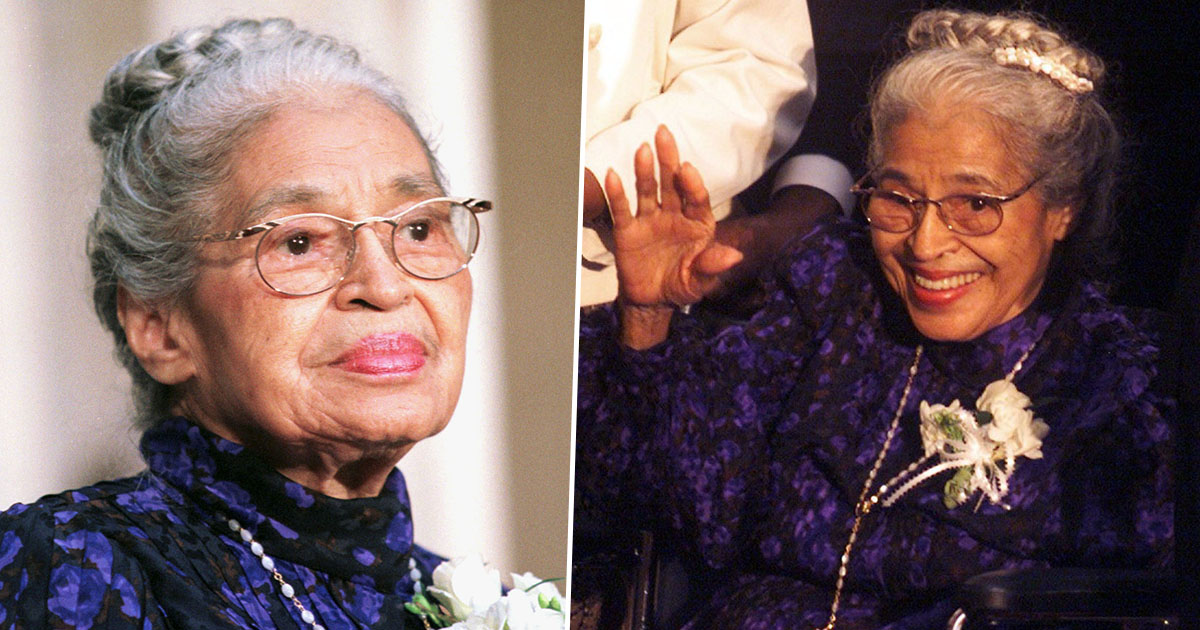
 Getty
Getty
13 years after her death and exactly 63 years after she refused to give up her seat on the bus, the work Rosa Parks did continues to shape and change lives.
The activist became known as the ‘mother of the modern day civil rights movement’ for the simple yet stunning act of refusing to give up her bus seat to make room for a white passenger in Alabama in 1955, resulting in her arrest and marking her place in history.
Rosa spent many of her years working to improve the lives of others. She put high school on hold in order to treat her ill grandmother, and then later her own mother, before finally pursuing her education and achieving her high school diploma in her early 20s.
Together, Rosa and her husband, who was self-educated, worked at the National Association for the Advancement of Colored People (NAACP), where Rosa served as secretary and later youth leader of the local branch.
Recognising their energy and optimism could be a force for change, a lot of Rosa’s work centred around young people.
View this post on Instagram
The NAACP work to to ensure the political, educational, social, and economic equality of rights of all persons, and to eliminate race-based discrimination.
Rosa’s fight for equality resonated with the public following her arrest, when her incredible defiance created a wave of change as black members of the Montgomery community were inspired to begin a bus boycott in a non-violent protest for equal rights.
With Martin Luther King Jr. as spokesperson, the boycott also served to make the pastor an inspiration and leader for organised, peaceful resistance against inequalities.
The protest lasted 381 days, and just over a year after Rosa’s arrest, on December 21, 1956, segregation on buses in Montgomery came to an end.
Now, December 1, the day of Rosa’s arrest, is known as Rosa Parks Day.
UNILAD spoke to Kenna Howat, Education Programs Manager at the National Women’s History Museum, who expanded on Rosa’s history and spoke about why continuing to recognise her work year after year is so important.
Kenna explained how Rosa spent her entire adult life fighting for equal rights for African Americans, right up until the day she died.
She was at the march on Washington for Jobs and Freedom at the Lincoln Memorial in 1963, and participated in the Selma to Montgomery March in 1965 alongside Martin Luther King Jr.
 Wikimedia Commons
Wikimedia Commons
Sharing her thoughts on the importance of Rosa’s actions, Kenna said:
Rosa Parks’ work has a continuing effect on people’s lives today in a myriad of ways. Every time a person of colour boards a bus or other modes of public transportation in the United States, they now have the ability to choose whichever seat they would like to sit in. This is all thanks to Rosa Parks.
Her sacrifice paved the way for every person of colour in the United States to have the right to equal public accommodations. “Separate but equal” is no longer the law of the land.
Kenna went on to point out Rosa was not the first person to take a stand against segregation on buses, but explained why hers was the one that was needed to begin the movement against it.
View this post on Instagram
The Rosa Parks Bus. #rosaparks #rosaparksbus #henryford #henryfordmuseum
She explained:
It is important that we never forget Rosa’s story because it is one of resilience and dedication. She was not the first person to refuse to move seats, but she was the person the movement needed.
A 15-year-old girl named Claudette Colvin did that only nine months earlier, but the NAACP chose not to prosecute her case because of her age.
It was this refusal in March 1955 that inspired Parks to act on December 1, 1955. She was not a ‘tired seamstress’ as many would have you believe. She was a Civil Rights activist who made a conscience choice to not move that day.
Her action sparked a movement that helped propel the Civil Rights Movement forward. The resulting Montgomery Bus Boycott changed the lives of African Americans in Montgomery and around the country.
This small act of peaceful resistance helped show others that change was possible.
 Wikimedia Commons
Wikimedia Commons
To commemorate the monumental moment, the Rosa Parks Library & Museum opened in the same place Rosa was arrested in Montgomery.
Her stand against racism inspired change which affected countless people, but her work didn’t stop there.
After losing her husband Raymond in 1977, the activist co-founded the Rosa and Raymond Parks Institute for Self Development with Elaine Eason Steele, who Rosa met when working in a sewing factory in the early 1960s.
View this post on Instagram
Drawing upon Rosa’s passion to inspire younger generations, the institute works to motivate and direct youths to achieve their highest potential and develop characters of pride, dignity and courage through training in life skills, as well as exposure to historical research and education surrounding civil rights.
As well as setting up the Rosa and Raymond Institute, Rosa inspired the creation of the Rosa Parks Scholarship Foundation, an organisation which awards scholarships to students of Michigan high schools in accordance with the values by which Rosa lived her life.
The foundation has awarded over $2,000,000 in scholarship money to more than 1,000 high school seniors since it was founded by The Detroit News and Detroit Public Schools in 1980.
Through the inspiration of Rosa, and with the help of the money awarded by the foundation, the lives of many students have been, and will continue to be, changed for the better.
 PA
PA
Delora Hall-Tyler, former President of the Foundation, explained its premise:
Rosa Parks devoted her life to creating access and opportunities for everyone, and the Rosa Parks Scholarship Foundation’s goal is a reflection of that.
With the passing of Mrs. Parks, we feel it is more important than ever to continue her legacy by helping young people meet their educational goals, which in turn allows them to achieve a better life.
After being awarded the scholarship, student Kimberly Trent went on to be in the Journalism Institute for Minorities at Wayne State University and earned herself a bachelor’s degree in journalism.
In the years since, Kimberly has gone full circle and is now serving as the foundation’s current president, rewarding scholarships to other budding students, making sure Rosa’s work and values continue to have a positive effect on people’s lives.
(function(d, s, id) { var js, fjs = d.getElementsByTagName(s)[0]; if (d.getElementById(id)) return; js = d.createElement(s); js.id = id; js.src = ‘https://connect.facebook.net/en_GB/sdk.js#xfbml=1&version=v3.2’; fjs.parentNode.insertBefore(js, fjs);}(document, ‘script’, ‘facebook-jssdk’));
Rosa Parks displays a portrait of herself at a dinner for Rosa Parks Scholarship winners June 30, 1987. Detroit News file photo/David Coates
Posted by Rosa Parks Scholarship Foundation on Tuesday, 28 January 2014
UNILAD spoke to scholarship recipient Akasha Bethel, who came from a low income family and was massively helped by the Rosa Parks scholarship to pursue her journalism degree at Wayne State University.
Akasha explained:
The scholarship was an absolute blessing. It helped pay towards my very expensive college tuition and on campus living, and therefore allowed me to embark further on the wonderful opportunity of furthering my education that not a lot of high school students are able to do.
The foundation carries on Rosa’s legacy in its own way. It allows students to continue their journey of education, and really gives them hope.
I know when I was awarded the scholarship I felt very proud, I felt like it was a reward I worked and strived for, and I was so incredibly excited and grateful to receive it.
View this post on Instagram
Rosa worked incredibly hard to make positive changes to the world, and though her mission is an ongoing battle, the courageous activist’s work did not go unrecognised.
According to the Rosa and Raymond Parks Institute website, Rosa received more than 43 honorary doctorate degrees, hundreds of plaques, certificates, citations, awards and keys to many cities.
In September 1996, US President Clinton awarded Rosa the Medal of Freedom, the highest award given to a civilian citizen.
 Getty
Getty
After being diagnosed with Alzheimer’s later in life, Rosa died at the age of 92 in October 2005.
It’s important Rosa’s work is always remembered, as her choices helped to change the world.
In her lifetime, the civil rights activist wrote four books documenting her story, her views, and her approach to the situations she experienced, offering readers a documented recollection from which they can continue to learn of her incredible actions.
Passionate about helping children, one of Rosa’s books, titled Dear Mrs. Parks: A Dialogue With Today’s Youth, documents children’s letters, as well as her responses, through which she shares her courage and wisdom and informs her readers how even the simplest actions can create staggering waves of change.
View this post on Instagram
Another of her books, I AM ROSA PARKS, is aimed specifically at young children, again to allow younger generations to learn about the important facts and influencers in civil rights history.
Rosa’s actions were remembered recently in popular culture through an episode of Doctor Who, where the show gave some details about the heroine’s backstory and recreated the resounding moment she refused to stand from her bus seat.
Take a look at the show’s moving tribute:
The programme was praised for the way it sparked a conversation among younger viewers, who may not have otherwise yet heard about Rosa or the historical facts surrounding her story.
One parent shared an image her son had drawn of Rosa, writing:
Came downstairs this morning to find my 7-yr-old son drawing this. He’s watched #Rosa 4 times already. Thank you for inspiring an entire generation. [sic]
. @bbcdoctorwho Came downstairs this morning to find my 7-yr-old son drawing this. He’s watched #Rosa 4 times already. Thank you for inspiring an entire generation @malorieblackman @_vinette #JodieWhittaker #13thDoctor and of course #RosaParks  pic.twitter.com/IZ0Aajgeq5
pic.twitter.com/IZ0Aajgeq5
— Amanda Duke (@littlemissduke) October 24, 2018
One of the episode’s writers, who was the actor portraying Rosa, commented on the show’s positive reception.
Actor Vinette Robinson tweeted:
Bit overwhelmed by the lovely responses to Rosa but by far the nicest thing is to hear is that it opened up family conversations with kids.
Kudos to [writer] Chris Chibnall for getting us talking about Rosa and the legacy she left us and where we are now.
While writer Malorie Blackman wrote:
Just come online to see my twitter feed has blown up! Thanks to all who said they loved Rosa. My fav comments are those which say the episode opened a conversation with their children [sic].
View this post on Instagram
One hour to go! Rosa, BBC One 
 #DoctorWho
#DoctorWho
In learning about the world-changing facts, through any platform, be it Rosa’s books, television or schooling, people are able to take on Rosa’s values for themselves, become more understanding of the struggles and history surrounding civil rights, and learn how simple actions can be used to make the world a more positive place.
In the choices she made, the work she did, and the legacy she left behind, Rosa’s work continues to affect lives even after her death. It’s imperative we never forget her story.
If you have a story you want to tell, send it to stories@unilad.co.uk.
Read more: unilad.co.uk

 :Getty Images]
:Getty Images]




Recent Comments